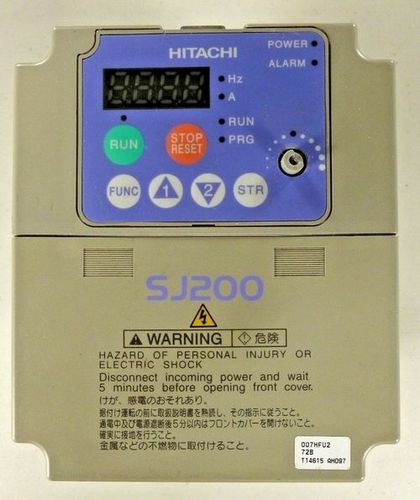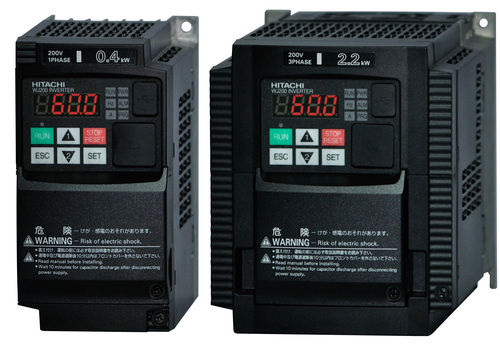Hitachi SJ200 AC Drive

Product Details:
- Feature Compact Design, Easy Operation
- Surface Finish Matte
- Mounting Type Panel Mount
- Humidity % <95% (Non-condensing)
- Shape Rectangular
- Efficiency 95%
- Connector Type Screw Terminal
5000 - 100000 INR
X
Hitachi SJ200 AC Drive Price And Quantity
- 10000.00 - 100000.00 INR
- 01 Piece
- 5000 - 100000 INR
- Built-In
- 0.4 kW to 7.5 kW
- RS485 (Modbus RTU Supported)
- 7-Segment LED Display
- 1
- 5
- Low
- 0.1 to 600 sec
- SJ200 Series
- V/F (Voltage/Frequency) Control
- 1 (0-10V/4-20mA Selectable)
Hitachi SJ200 AC Drive Product Specifications
- Integrated
- 0.98
- Industrial Automation, Motor Control
- 200-240V AC
- Grey
- Thermoplastic
- Terminal Block
- IP20
- Screw Terminal
- -10°C to +50°C
- 3-Phase Output
- 200–240V AC
- 95%
- 1.4 kg
- 50/60 Hz
- AC Drive
- Standard
- 2
- Rectangular
- <95% (Non-condensing)
- ABS Plastic
- Overcurrent, Short Circuit, Overvoltage
- 150 mm x 125 mm x 130 mm
- Optimized for Efficiency
- Compact Design, Easy Operation
- Matte
- Three Phase
- Panel Mount
- Built-In
- 0.4 kW to 7.5 kW
- RS485 (Modbus RTU Supported)
- 7-Segment LED Display
- 1
- 5
- Low
- 0.1 to 600 sec
- SJ200 Series
- V/F (Voltage/Frequency) Control
- 1 (0-10V/4-20mA Selectable)
Hitachi SJ200 AC Drive Trade Information
- 100 Piece Per Month
- 1 Days
- Yes
- All India
Product Description
Unicorn Controls & Automation is Authorized Dealer & Distributor of Hitachi SJ200 AC Drives in India for all control for various application. Hitachi SJ200 AC Drive originated from Japnees Technology. Hitachi SJ200 AC Drive have various type of control mode like V/F, Flux Vector control, Torque Control etc. Hitachi SJ200 AC Drive running with great energy saving.
Hitachi SJ200 AC drives high class AC Drive inbuilt braking chopper upto 30kw. 200% Starting Tourque 10sec. Hitachi SJ200 AC Driveused in all kind of application like Fan, Pump, Grinder, Spindle, Extruder, Hoist, Elevator etc. Hitachi SJ200 Series Drive available from 1HP TO 500hp.
Advanced Motor Control for Industrial Automation
The Hitachi SJ200 Series AC Drive delivers precise speed and torque control for three-phase motors in industrial automation. Its V/F control method ensures smooth acceleration and deceleration, adjustable from 0.1 to 600 seconds. With optimized energy consumption and a built-in braking unit, this drive enhances both efficiency and performance, making it ideal for manufacturers, exporters, and industrial integrators seeking reliable automation solutions.
Seamless Integration and Versatile Connectivity
Offering multiple digital and analog inputs alongside Modbus RTU support via RS485, the SJ200 series easily integrates with diverse control systems. Its terminal block and screw terminal connections simplify installation, while the 7-segment LED display ensures straightforward operation. The drives compact ABS plastic housing and IP20 rating provide durability and flexibility for panel mounting in varied industrial settings.
FAQs of Hitachi SJ200 AC Drive:
Q: How do I install the Hitachi SJ200 AC Drive in my automation system?
A: To install the SJ200 AC Drive, mount it securely on a panel using its designated mounting slots. Connect three-phase power supply (200-240V AC) to the terminals, wire inputs/outputs per your control setup, and integrate the RS485 port if Modbus RTU communication is required. Ensure all connections use the provided terminal blocks and follow the user manual for safety and proper configuration.Q: What benefits does the V/F Control Method offer for motor applications?
A: The V/F (Voltage/Frequency) Control Method in the SJ200 Series provides smooth and precise control of motor speed and torque, ideal for applications requiring energy-efficient operation and reduced mechanical stress. This allows accurate acceleration and deceleration, extending motor life and reducing maintenance costs in demanding industrial environments.Q: When should I use the analog vs. digital inputs on the SJ200 Series?
A: Analog inputs are ideal for variable inputs like speed references, where you can use either 0-10V or 4-20mA signals based on your process requirements. Digital inputs are suited for fixed command signals such as start/stop, direction control, or preset speed selection. Choose the input type based on the specific control need of your application.Q: Where can the SJ200 AC Drive be applied?
A: The SJ200 can be deployed in a wide range of industrial automation scenarios, including conveyor systems, pumps, fans, and motor-driven machinery. Its compact design and robust protection features make it suitable for manufacturing plants, process industries, and any setting where efficient and reliable motor control is essential.Q: What process does the integrated overheating protection follow?
A: The integrated overheating protection monitors the drives internal temperature during operation. If the temperature exceeds safe thresholds, the drive automatically reduces output or shuts down to prevent damage. This ensures safety, minimizes downtime, and prolongs the lifespan of both the drive and connected motor.Q: How does the SJ200 AC Drive optimize energy consumption?
A: The drive is engineered with energy-saving algorithms and a high power factor (0.98), which collectively minimize power losses during operation. Its efficient voltage and frequency control ensures the motor only consumes as much energy as needed for the application, reducing overall operational costs.Tell us about your requirement

Price:
Quantity
Select Unit
- 50
- 100
- 200
- 250
- 500
- 1000+
Additional detail
Mobile number
Email








